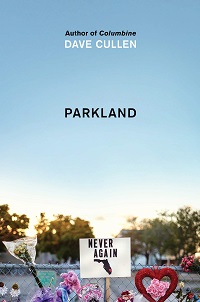Activism in Action | Social Sciences, March 2019
An emotionally gripping, very human portrayal of the people behind March for Our Lives; an important addition to recovery/bereavement literature that will be of interest to civic leaders and readers seeking to learn more about trauma-informed therapy, community planning, and emergency management

![]() Cullen, Dave. Parkland: Birth of a Movement. Harper. Feb. 2019. 400p. ISBN 9780062882943. $27.99; ebk. ISBN 9780062882974. SOC SCI
Cullen, Dave. Parkland: Birth of a Movement. Harper. Feb. 2019. 400p. ISBN 9780062882943. $27.99; ebk. ISBN 9780062882974. SOC SCI
We all know about the mass shooting at Marjory Stoneman Douglas High School in Parkland, FL, the movement it sparked, and the teens who continue to speak truth to power. But do we really know the young people behind the tweets and interviews? Journalist Cullen ( Columbine) tries to answer that question, documenting the impact of the tragedy and pain that swept through the community, as well as the movement that served as a lifeline for all involved. This work gives voice to the faces behind March for Our Lives, exploring their world behind the scenes to introduce a group of extraordinary people thrust into the public eye by one of the worst events in U.S. history. Exposing the physical and emotional effects of activism in light of tragedy while examining the solace of action and community, Cullen presents a well-balanced review of the Parkland shooting without too much emphasis on the perpetrator or the horrors of the day.
VERDICT An emotionally gripping, very human portrayal of the people behind March for Our Lives. A solid choice for readers interested in current affairs, gun legislation, and young people in America.—Gricel Dominguez, Florida International Univ. Lib., Miami

![]() Glaser, Melissa. Healing a Community: Lessons for Recovery After Large-Scale Trauma. Central Recovery. Feb. 2019. 226p. bibliog. ISBN 9781942094906. pap. $21.95; ebk. ISBN 9781942094883
Glaser, Melissa. Healing a Community: Lessons for Recovery After Large-Scale Trauma. Central Recovery. Feb. 2019. 226p. bibliog. ISBN 9781942094906. pap. $21.95; ebk. ISBN 9781942094883
More than 300 U.S. school shootings have occurred since the Sandy Hook Elementary massacre devastated the small community of Newton, CT, in 2012. Appointed to guide a recovery and resiliency team tasked with coordinating strategies to deal with the mental, psychological, and social impact of the trauma, Glaser (former behavioral health director, Catholic Charities) brings compassion and skill to the field of therapeutic recovery and the politics of funding and grant administration in this insightful and pragmatic look at healing individuals and communities after a massive tragedy. Notable lessons include the importance of clarifying roles even among experts, monitoring expectations among agencies as well as the dynamic needs of families and individuals impacted by trauma long after the initial event, while ensuring that civic leaders are part of the dialog of healing. Glaser briefly outlines therapies and programs that can be individualized to meet an array of needs and stages of healing; however, this is by no means an in-depth study of the psychology or treatment of trauma.
VERDICT An important addition to recovery/bereavement literature that will be of interest to civic leaders and readers seeking to learn more about trauma-informed therapy, community planning, and emergency management.—Bernadette McGrath, Vancouver P.L., Canada
RELATED
ALREADY A SUBSCRIBER? LOG IN
We are currently offering this content for free. Sign up now to activate your personal profile, where you can save articles for future viewing









Add Comment :-
Comment Policy:
Comment should not be empty !!!